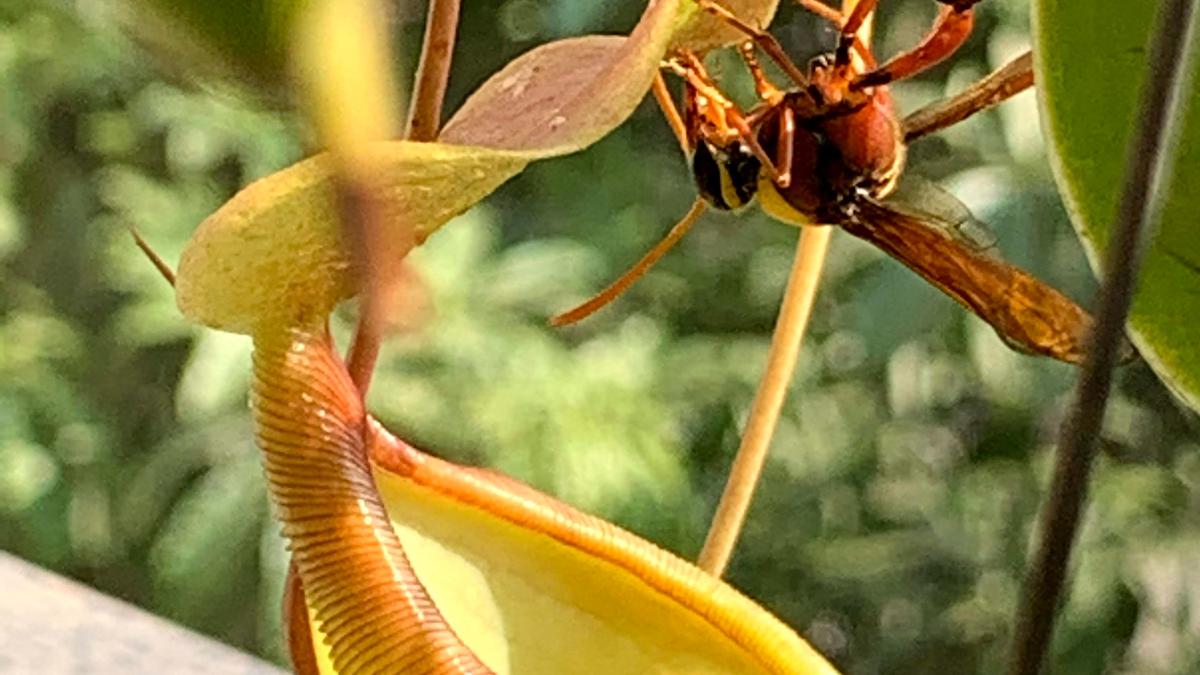
Beastly beauties: Carnivorous plants slowly take root in Bengaluru
The Hindu
Carnivorous plants take root in Bengaluru
Remember the good old commercial of a mosquito repellant brand in which the vaporizer machine opens its mouth and starts catching flies? Well, the real-life version of this has always existed yet somehow never found many takers. It is alive, beautiful, intelligent, and in a nutshell, a wonder of nature — we are talking about carnivorous plants such as the Venus flytrap, nepenthes and pitcher plant, which get a majority of their nutrients by consuming insects.
Although a gorgeous and colourful addition to any home or kitchen garden, they are not quite commonly found in one’s backyard, along with roses or a money plant. We speak to a few plant enthusiasts to get an insight into these flamboyant beauties and find out why carnivorous plants are not as popular as they could be.
It was during a trip to Amsterdam in 2017 that Dominic Savio, a tattoo artist from Bengaluru, fell in love with insectivorous plants. “I saw them being sold in all the flower markets and wondered why something so fascinating was not better known in India,” he recollects. In 2020, he started a nursery dedicated to carnivorous plants called Domzhungryplants and today, specialises in growing different types of Venus flytraps.
Dominic also conducts workshops in schools and colleges about carnivorous plants regularly and admits that the reactions from students and educators are “incredible”. “Children are excited to see them. These plants are more like an intelligent pet. They can survive even without insects, just like any other plant. However to thrive, they need to consume insects — this gives them much-needed nitrogen and is also like a boost of fertilizer for them.”
The story of Dheemanth Bhandarkar’s passion for carnivorous plants started when the IT professional from Mangaluru saw a pitcher plant at one of the farms in his city. Gradually, he started looking up carnivorous plants on social media to connect with like-minded people and began to purchase plants from all across the country.
“Today, I have 50 varieties of carnivorous plants and occasionally sell them, but it is more of a hobby. The plus point of being in Mangaluru is the high humidity in which some of these plants thrive,” says Dheemanth, who has a page called Nepentheism India on social media. He has even conducted a webinar on the topic to create awareness.
Carnivorous Plants India is one of the popular social media groups which all carnivorous plant-lovers recommend. Bengaluru-based Santosh Basavaraju, a scientist at ISRO, is a moderator of the page which has around 6,600 followers. “I was always intrigued by wildlife and my interest in these plants started around three years ago,” he reminisces.

In October this year, India announced its intention to build Maitri II, the country’s newest research station in Antarctica and India’s fourth, about 40 forty-odd years after the first permanent research station in Antarctica, Dakshin Gangotri, was established. The Hindu talks to Dr Harsh K Gupta, who led the team that established it

How do you create a Christmas tree with crochet? Take notes from crochet artist Sheena Pereira, who co-founded Goa-based Crochet Collective with crocheter Sharmila Majumdar in 2025. Their artwork takes centre stage at the Where We Gather exhibit, which is part of Festivals of Goa, an ongoing exhibition hosted by the Museum of Goa. The collective’s multi-hued, 18-foot crochet Christmas tree has been put together by 25 women from across the State. “I’ve always thought of doing an installation with crochet. So, we thought of doing something throughout the year that would culminate at the year end; something that would resonate with Christmas message — peace, hope, joy, love,” explains Sheena.

Max Born made many contributions to quantum theory. This said, he was awarded the Nobel Prize for physics in 1954 for establishing the statistical interpretation of the ____________. Fill in the blank with the name of an object central to quantum theory but whose exact nature is still not fully understood.










